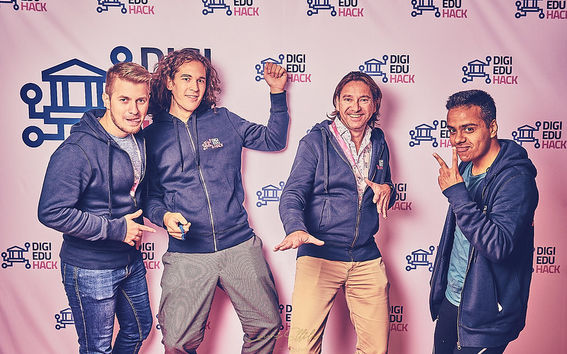130 innovative ideas redesigning the future of education

DigiEduHack gathered more than 1700 participants solving 60 challenges simultaneously during 24 hours, in 21 countries in Europe, Africa, Asia, South and North America. The main event was held at Aalto University in Finland. The result is more than 130 solutions to today’s and the future’s biggest challenges in digital education.
The innovations, coming from all corners of the globe, are presenting solutions to a range of challenges in the digital age. Along with relevance, quality, originality, feasibility and transferability, sustainability was one of the core criteria for the judges picking out the best solutions:
“In Torino, Italy, the winning team is proposing an exchange community for reducing food waste using a virtual application and physical lockers for food exchange. The winning team from Vienna, Austria, is suggesting a chatbot, that gives you the most environmentally friendly transport suggestions for going to work, school or even a holiday trip”, says Project Manager Ida Andersson, Global DigiEduHack.
“All the submissions demonstrated a great background research of the topics such as waste management in Austria, recycling, and carbon footprint”, says Mihaela Rozman, coordinating the local DigiEduHack at Vienna University of Technology.
In the spirit of sustainability, DigiEduHack also arranged three online hackathons. The winner of the Copenhagen edition, Denmark, presented the ‘ClimActHub’, an online platform that works as a social media channel, a dating app, online classroom and gaming zone.
“In ClimActHub people interested in fighting climate change can share their actions, connect, team up working on startups or other initiatives, offering their expertise to other people in an online classroom environment. They can also play educational games focusing on for example how to diminish CO2 emissions. It links peers together, enables lifelong learning and acquisition of green skills interactively”, the team explains.
Virtual platforms
Creativeness and imagination can be seen in all the winning solutions:
“One team from St Petersburg, Russia, created a virtual reality platform for teaching first aid skills and managing one’s stress in emergency situations. The platform contains gamification elements to make the experience more memorable and enjoyable”, says Project Manager Ida Andersson, Global DigiEduHack.
There were also many solutions targeting children. In Tallinn, Estonia, the winning team suggested an online platform connecting bullied kids, their parents and experts that the kids can trust. The platform would offer a safe space where the issues could be addressed and solved. At the main event in Espoo, Finland, one team suggested an application that will push kids to start reading again, offering an application and tracker platform, making reading fun and creative through collaborative games measuring emotions and enabling virtual interaction between the pupil and the teacher.
In Bucharest, Romania, the winning team presented the ‘Body Buddy’, an app that will help children gain basic knowledge on the different areas of the body, the different nutrients each body part requires and in which food sources those nutrients are available.
Awarding the best global solutions
In St Petersburg, the local DigiEduHack organizers were amazed by the standard of the solutions presented:
“The number of creative and well-developed projects presented at the event amazed us. Some of the teams managed not only to develop a concept but also to build a prototype and a website for the solution. If we had the opportunity to choose more winners, we would definitely send at least ten projects to the international committee”, says Kristina Kruhinskaya at ITMO University in St Petersburg.
In Nairobi, Kenya, Professor Robert Gateru and his team was coordinating their local edition of DigiEduHack:
“The participants enjoyed the event deeply and expressed gratitude for the opportunity to participate in shaping their learning experience. Most of them have started the processes of developing their ideas further towards commercialization and intellectual property protection.”
DigiEduHack does not end here – instead it gets even more exciting. The DigiEduHack Steering Committee & European Commission have now selected 10 finalists among the local winners to compete for the Global Award. By voting for their favourites, the general public will get the chance to decide which winning teams will get 5,000 euros to implement their ideas and be recognized as Digital Education Ambassadors.
The finalist representing Aalto University are Booklistics - Your Reading Mentor and Think Playfully through 3D learning - remember to cast your vote by 23 November!
Check out the 130 solutions here
Vote for the Aalto University finalists here
Check out the photos from the Aalto main event
Read more news

MyCourses additional maintenance downtime on Tuesday, 24 March 2026, from 9:00 to 16:00
Service break in MyCourses Tue 24.3.2026.
Join a Unite! matchmaking event on forging new consortia for Horizon Europe applications
Calling researchers and industry partners to connect at a virtual matchmaking session designed to spark project collaborations for Horizon Europe funding. Registration deadline, 12 March.
Join the Unite! Virtual Education Summit- Registration now open
Join us in shaping international collaboration! This online event takes place 12 March, 2026.






